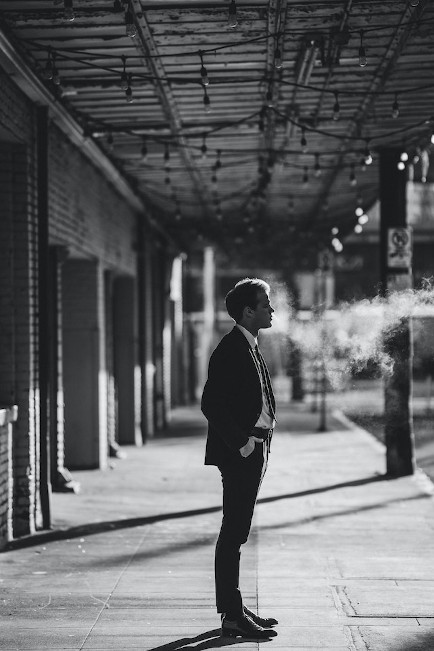Reflections on Sorrow and Happiness Past

I am sitting across from my father. The smoke from his cigarette hovers above my head and I hold his hand, hoping it can glue me back together. I have returned after the untimely death of my boyfriend. I am here to regain my balance.
My father sits back trying to recall my first walk across the tightrope, the initial plunge, the consequent falls, however you want to mark the spot. Perhaps I was never steady, thrown off course long ago. My mother, refusing to allow my faith to disappear, repeats a story I have often heard: I was dying inside her and just when doctor, nurse, and family gave up, I didn’t. Instead, I chose to cry and scream and claim my place among my race. She smiles as she tells this as if to say, you have always defeated the worst.

I mutter this story under my breath whenever I begin to fall. I shut my eyes and recall the circumstances I have withstood: a revolution, exile, a car accident that put my life on hold for a year, and deaths, too many to count. I smile regretfully. I learned early on that suffering gracefully is not a skill; remaining upright after the storm, however, is.
I think back to the beginning. Only then will I be able to stop and say, “That’s what did it; that’s what threw me off.” I was a stranger to my homeland. As is typical of diplomatic life, I roamed the world erasing borders, only to pencil them back in once the diplomatic status was changed to immigrant. I lived in seven countries, confused other languages with my own, hopped from one international school to the next, and befriended other nomads, all of us leery of those rooted to the spot.
“Stop moving; stay here,” my father says.
“Why?” I ask, bewildered.
“To clear your thoughts,” and it’s so simple. I must stand with feet firmly on the ground and step into my haphazard past to rebuild a sturdy future. So I drag out dusty photographs and study my tracks, eager for a glimpse of the things I have missed.

“You’re lucky; you’ve always lived as you wished,” my acquaintances, those who opted to float between Washington and New York, sigh and pat me on the back. To them, I was the one who always traveled, managed to find employment in places where an unknown foreigner faces additional obstacles and the kind words from connections back home aren’t always good enough. Now in their 50s, many question their careers, tired of laborious lunches with contacts who grant favors first and request them later, and the constant need to watch their backs in case their enemies – or ruthless, backstabbing so-called friends – are gaining on them.
I listen, surprised at their worries. I have always admired their smooth, unfailing balance. Now, as I return to the drawing board to find once again the who and the where of my life, I am astonished that they encourage my gambles and shake their heads, sorry that they never got around to taking that year off in Africa or joining the Peace Corps as they had planned long ago.

I laugh at their unwarranted regard as I sit through another interview for a job that I do not want. I am handed tests that I stumble through mindlessly. I am too tired to apologize that I am wasting their time for a reason, that I have always known what I must do and I have finally reached the stage where I have no choice but to begin. But how is it possible to say this? Only one manager, a tall, thin, thoughtful man with kind eyes asked, “Why are you here?” I think of him often. Without realizing, he explained that the equilibrium I seek is within my reach.
So I sift through jarring memories to retrieve the ones that restore my hope. It is 1981 in The Hague. My Dutch tutor has ordered me to write an essay answering the question of what I hope to be when I grow up. My last effort, describing my desire to be a well-read shepherdess has been tossed aside. As revenge, I produce a lengthy document explaining that, actually, my real ambition is to become a cool American. Years later, unbeknownst to the both of us, I do become an American – cool, or otherwise.

I flip forward to 1992, Berkeley. I find shelter in a bookshop to escape the pouring rain. Selecting a book of Irish fiction off the shelf, I finish the book in one sitting. Astonished by the remarkable stories, I later vow to my cousin that I have discovered my life’s calling. Later, having forgotten the book and the oath, I land a job with a book publisher. My boss, expecting me to familiarize myself with their work, walks me over to bookshelf, where the aforementioned book sits gathering dust.
Later in Europe … I make an obligatory phone call and talk to a stranger with the kindest voice I have ever heard who has answered on behalf of the person I need to reach. He is polite, quiet, and reserved. The conversation is brief, formal, and when I hang up, I sense that he will come into my life. Four months later, he does.

Perhaps it’s coincidence, chance, what have you, that has forced these events, some wished for, others not. I know now that life unfolds itself regardless of our wants and the only choice offered is the reaction we select to deal accordingly.
For now, I stare down the clock and bide my time, well aware that time alone can ease my ache. I turn instead to family and friends who have taught me the power of determination. I am haunted by their voices, and I listen as they explain that I have fallen, only to rise again from the ashes, as I always have.
Author Bio:
Tara Taghizadeh is a writer and the founding editor and publisher of Highbrow Magazine. Her writings have been published in the Chicago Tribune, Atlanta Journal-Constitution, Washington City Paper, San Francisco Weekly, and other publications.
For Highbrow Magazine
Image Sources:
--Maria Orlova (Pexels, Creative Commons)
--Suzy Hazelwood (Pexels, Creative Commons)
-- JEShoots -- Pixabay (Creative Commons)
--Geralt (Pixabay, Creative Commons)
--Felicity Tai (Pexels, Creative Commons)
--Min An (Pexels, Creative Commons)































































































































































































































































































































